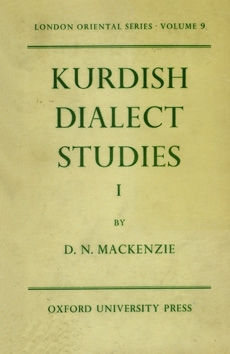| Éditeur : Oxford University Press | Date & Lieu : 1961-01-01, London |
| Préface : | Pages : 248 |
| Traduction : | ISBN : |
| Langue : Anglais | Format : 140x220 mm |
| Code FIKP : Liv. Ang. Ku. Gen. 304 | Thème : Linguistique |
|
Présentation
|
Table des Matières | Introduction | Identité | ||
 Versions
Kurdish dialect studies -I- | |||||
|
Introduction Brevis esse laboro… The survey of Kurdish dialects which follows is based primarily on material gathered during a visit to Iraqi Kurdistan in 1954-5. only in the case of the Suleimani dialect has it been possible to supplement this material where necessary with examples from printed sources. It was originally intended to spend an equal period of time in the Kurdish-speaking areas of Turkey and Iraq in the event, permission not being forthcoming from the Turkish authorities, some ten months were spent in northern Iraq, between Halebje and Zakho (Map B). From the towns of Suleimaniye and Akre as bases visits were made to the centres of as many dialect areas as could profitably be covered in the time available. Where possible the linguistic notes made were supported by connected texts, either taken down directly from dictation or recorded on magnetized tape and then transcribed. Inevitably these texts are of unequal value, according both to the nature of their authors and to the possibility of checking them. However, of the texts transcribed without the assistance of the authors those from Barwārī-žôr are the only ones presented about which any serious doubt remains. Throughout the history of Kurdish dialect studies it has been notoriously difficult to find trustworthy informants, even in situ. Thus chodzko's informant in Paris was an aristocrat better acquainted with Turkish and Persian than with his mother tongue; Prym and Socin were obliged to obtain most of their Kurdish texts from an Aramaic-speaking Christian and an itinerant Jewish story-teller; Makas's Mardini Kurd, who had travelled for years in Eastern Europe, was telling stories he had heard twenty years before; even in recent years the authors of the Kurdoev - Cukerman texts were refugees who had arrived in the Caucasus by stages from various parts of Turkey. The same difficulty was encountered in Iraq in certain cases. Thus the author of the main Bingirdī text (Bin. 314-79), a man of about twenty-five years of age, had lived for about one year in … | ||||